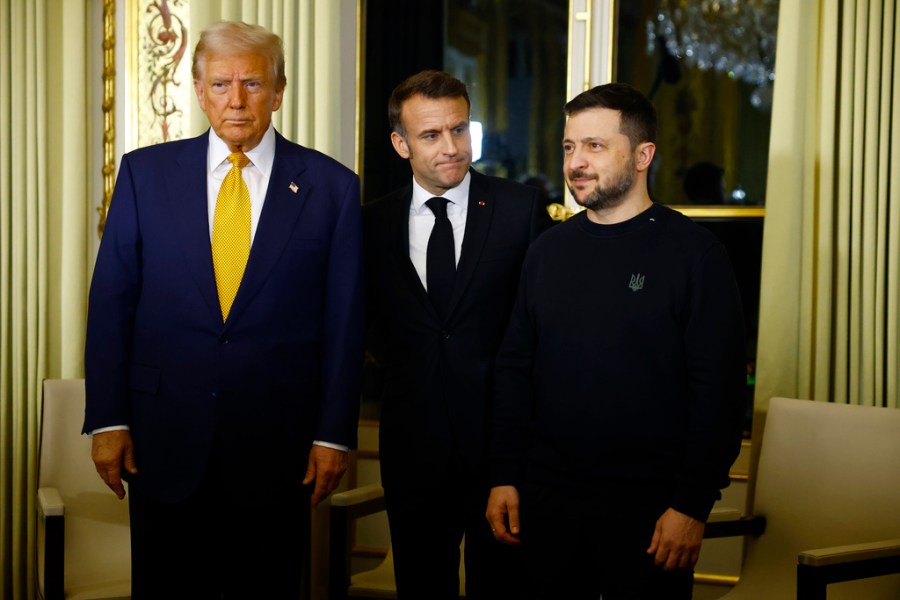
The Biden administration was justifiably criticized, including by me, announcing what actions they were unwilling to take in order to prevent or respond to Russian aggression. President Biden and his national security advisor’s fear of escalation had them more focused on possible actions by Vladimir Putin, if confronted, rather than Putin frightened of what we might do if Russian aggression continued.
In what Senate Armed Services Chairman Roger Wicker (R-Miss.) called a “rookie mistake,” Trump’s new Defense Secretary Pete Hegseth has repeated a Biden blunder.
Prior to negotiating an end to the war in Ukraine, or even deciding who will sit down at the table to reach a ceasefire, Hegseth has telegraphed to the Kremlin what the Trump administration will not do. Secretary of State Marco Rubio compounded this after his meeting in Riyadh with his Russian counterpart gushing about a geostrategic partnership between Moscow and Washington.
In the campaign, the Trump team frequently invoked Ronald Reagan’s “peace through strength,” stressing the importance of deterrence and that its absence had led to a world on fire with wars in Europe and the Middle East, preventing needed attention on the real threat from China.
However, how many of Reagan‘s lessons are truly understood by the Trump administration’s national security team and those in Congress? Do they grasp the policies that marshaled the economic, technological and military power to build prosperity at home and win the Cold War, the precautions, and policies that defined Reagan’s leadership?
Convinced that a well-funded, modernized U.S. military would deter aggression, Reagan’s goal was to prevent war by making conflict too costly for adversaries, backing up diplomacy and economic tools with hard power. He also understood that aggression unaddressed was provocative and would impact America unless we maintained U.S. security commitments. On June 6, 1984, at the 40th anniversary of the D-Day landings Reagan proclaimed:
“We in America have learned bitter lessons from two World Wars: It is better to be here ready to protect the peace, than to take blind shelter across the sea, rushing to respond only after freedom is lost. We’ve learned that isolationism never was and never will be an acceptable response to tyrannical governments with an expansionist intent.”
Reagan’s words sharply contrast Hegseth’s first address to NATO at the Ukraine Defense Contact Group; he said that Ukraine is unlikely to become a member of NATO and that its pre-war borders are no longer achievable. Remarks that have forced European countries to doubt America’s security commitments. President Trump has doubled down on this, calling Ukrainian President Volodymyr Zelensky “a dictator without elections” and said he should have “never started” the war with Russia. Reagan was clear-eyed in distinguishing a partner from an evil empire.
Just as Washington cannot escape the outcome of Russian aggression and should continue its support of Ukraine, the war is occurring in Europe and more must be done by our European allies. President Trump deserves credit for European allies increasing their defense spending. Led by Poland and the Baltic countries, these nations understand that Putin’s appetite comes with eating. In the 25 years that Putin has ruled Russia, a constant goal has been to drive a wedge between Washington and our NATO allies. We must work to ensure that he does not satisfy this desire.
In the Middle East the Abraham accords, achieved during President Trump’s first term, were the first treaties negotiated between Israel and its Arab neighbors in decades. Even in light of this impressive achievement, the president’s Gaza plan — to turn the territory into the Riviera of the Middle East and relocate its Palestinian residents suggesting an intervention — gives one pause.
Reagan, like Trump, wanted to see stability come to the Middle East. To assist a fragile 1983 ceasefire in Lebanon, the Reagan administration deployed Marines to separate the belligerents. Tragically, 241 were killed when their barracks were destroyed by a terrorist bomb, leading Reagan to withdraw the remaining servicemen. Despite peaceful intentions for a people who had experienced too much suffering, neither the peace in the Middle East nor the U.S. prestige was enhanced by this tragic episode.
The Trump administration is wise to prioritize the threat from China — something President Trump was the first to recognize. However, unlike during his first term this cannot be done to the exclusion of countering Russian aggression or belligerents from Tehran. Our NATO commitment is not a weight which prevents movement towards addressing the threat from China, rather it is an asset on the right side of the scale enhancing our ability to confront the combined challenge of China, Russia, Iran and North Korea.
Ending the carnage in Ukraine is the right policy, something the Biden administration did at too leisurely a pace. However, achieving this at the expense of the NATO alliance and countries most vulnerable to Putin’s revanchist policy and to the benefit of the Kremlin will only strengthen the Axis of the Aggrieved.
American leadership is critical to our prosperity and a stable world order, something Ronald Reagan understood. He could also recognize a bad deal, criticizing advocacy for a treaty negotiated by the Carter administration as “cloaking weakness in the suit of virtue.” President Trump should build on the foreign policy success of his first term and join with Kyiv and NATO to achieve a big beautiful deal that preserves the sovereignty and security of Ukraine and does not reward Russia and its partners.
David A. Merkel is an associate with LSE IDEAS and a visiting distinguished fellow at the College of Charleston. He served as deputy assistant secretary of State for European and Eurasian Affairs and director for South and Central Asia at the NSC.












